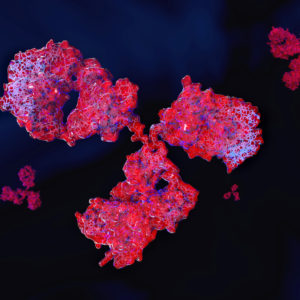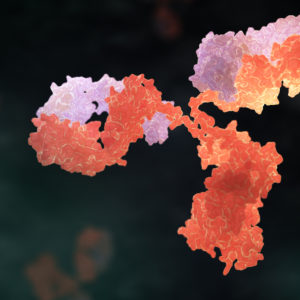Mycoplasma
Mycoplasma pneumoniae is a bacterium that causes acute respiratory disease, ranging in severity from mild respiratory illness to severe pneumonia. The bacterium can be fatal for a small number of people and has on rare occasions, been associated with severe complications such as encephalitis. There is no vaccine against Mycoplasma pneumoniae, but it is susceptible to a range of antibiotics. However, antimicrobial resistance to macrolides is increasing globally and threatens the effective treatment of bacterial infections.
The Native Antigen Company have developed a native mycoplasma antigen for development of sensitive immunoassays.
Mycoplasma pneumoniae Background
Mycoplasma pneumoniae is small, atypical bacterium of the Mollicute class, and a member of the family Mycoplasmataceae. Mycoplasma pneumoniae was first isolated by Eaton et al. in 1944 and is now recognised as a major cause of respiratory tract infection in humans.
Mycoplasma pneumoniae is geographically widespread, causing respiratory disease in children and adults and is one of the causative agents of community-acquired pneumonia. Transmission of M. pneumoniae from human to human is predominantly caused by close contact with airborne respiratory droplets from an infected individual. M. pneumoniae is sensitive to desiccation and therefore, close proximity to an infected individual is necessary for successful transmission (CDC).
Mycoplasma pneumoniae is an extracellular pathogen that lacks a cell wall and has the capability of reproducing by itself. It can adhere to, and infect the epithelium in the upper and lower respiratory tract, resulting in the gradual development of disease symptoms, typically occurring over a period of 1-4 weeks. The clinical symptoms associated with M. pneumoniae infection are diverse, but the disease is characterised by the onset of fever, headache, general malaise, pharyngitis, tracheobronchitis and a persistent cough that increases in severity. In some cases, infection can result in severe respiratory disease and clinical complications affecting extrapulmonary sites (Waites, KB et al).
Mycoplasma pneumoniae infection is self-limiting in most cases, but may persist for several months, even after treatment. Diagnosis of M. pneumoniae infection is currently performed using serological or molecular methods of detection. However, current methods of detection are time consuming and lack necessary sensitivity. Improved assays are needed for rapid point-of-care diagnosis of the disease (CDC).
References
- Center of Disease Control and Prevention:Mycoplasma pneumoniae infection, Disease specifics.
- Waites, KB and Talkington, DF (2004). Mycoplasma pneumoniae and Its Role as a Human Pathogen.Clin Microbiol Rev. 17(4): 697–728.
- Center of Disease Control and Prevention: Mycoplasma pneumoniae infection, diagnostic methods.
- Figueiredo ML and Figueiredo LT (2014). Emerging alphaviruses in the Americas: Chikungunya and Mayaro. Rev Soc Bras Med Trop.47(6):677-83
Mycoplasma Antigens
The Native Antigen Company’s Mycoplasma pneumoniae antigen is produced from whole organisms that have been purified and detergent-treated to enrich antigenic proteins and decrease background contaminants. Mycoplasma pneumoniae is recognised as one of the most common causes of community-acquired pneumonia. Early diagnosis of M. pneumoniae (usually by ELISA IgM) is important as the infection often responds well to appropriate antibiotics.
However, ELISA assays, particularly those for IgM detection, often exhibit poor sensitivity and may, be susceptible to cross-reactivity from other pathogens. Our highly-purified mycoplasma antigen preparation is highly reactive to IgM and offers in vitro diagnostic (IVD) manufacturers the opportunity to introduce next generation ELISA assays that demonstrate greater specificity against an inherently low background signal.
Mycoplasma Antibodies
The Native Antigen Company is pleased to offer a panel of monoclonal antibodies specific for the mycoplasma pneumoniae P1 protein. Several of these antibodies can be used as matched-pairs in the development of immunoassays for the detection of mycoplasma infection.
Questions?
Check out our FAQ section for answers to the most frequently asked questions about our website and company.




